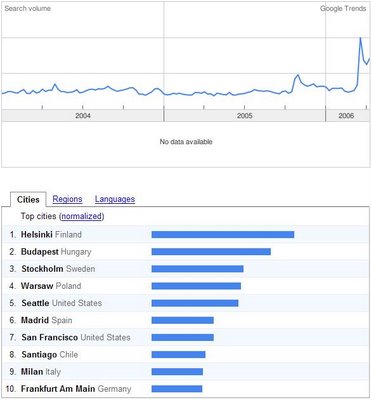If you've been reading my blog for any amount of time, you've probably noticed that poetry is a hobby of mine. Like many hobbyists, I take mine quite seriously (and I think I do well at it, thank you very much).
I am fortunate that I have a set of friends who are willing to not only indulge my desire to share my poems but who are also willing to critique them. I was recently discussing a batch of poems with my friend Rob when mentioned that the shape of a poem -- which is to say the layout of the words on the page -- is an important part of a poem.
Rob replied that he really didn't see that and that, for him, the only thing that really mattered was the way that a poem sounded when he read it. A composed a response to him that is, with some modifications, today's essay.
For this essay I'll be using three of my own poems: "Cheops", "Fragments", and "Origami Redux". I want to state up front that I don't consider any of these to be particularly excellent poems (all of them are very early works of mine); however, they do have the advantage of being illustrative of my points.
Let us start with "Cheops". I wrote this poem in imitation of a 19th century fad where poets laid out their poems in the form of pictures (the most impressive one was of a swan). "Cheops" is a fairly simple example of the style.
I
see
Death
He will
not steal
These loves
The Nile that
moves slowly or
the feel of blood
I am Pharaoh I will
rise above the wretch
for I am a god and time
will bow to my holy whims
Now let us contrast this with a version laid out in a more conventional format:
I see Death
He will not steal these loves:
The Nile that moves slowly
Or the feel of blood
I am Pharaoh
I will rise
Above the wretch
For I am a god
And time will bow
To my holy whimsIn both cases we have the same words, but notice how the layout impacts how the poem is read and interpreted.
You might suppose that I'm going to suggest that the triangular layout is superior but, in fact, I think that it ends up detracting from the poem by distracting us away from the words and lending a perception that the entire poem is really just a gimmick (which is precisely what it was when I originally wrote it). The second layout, on the other hand expresses the core ideas of the poem while also giving us a number of subconscious cues.
Note how the first, third and fifth stanzas are single lines and note the content of those lines. On the one hand it sets up a sort of mental cadence (short, long, short, long, short, long) that impacts how we read the poem (which, in turn, impacts the sound of the poem). Even more subtly, stanza one introduces the person of death, stanza three introduces the person of the Pharaoh, and stanza five expresses the relation of Pharaoh to Death (he's a god and thus above Death). Stanzas two, four and six, by contrast, are narrative stanzas that tell a miniature story about Pharaoh's love of life, his self-perception, and his desire to defeat death.
The second version of the poem, which only differs in shape from the first, has layers of nuance that the first completely lacks. Although the triangular form has a sort of rude cleverness, it actually ends up subverting poem, turning it into a cheap trick. The very same words, in a different form, give us something that is, I think, much better than the original.
The next example is a poem called Fragments. It's a fairly maudlin poem, but it has a very unusual sort of structure.
you
holding him
he
doesn't care
(i do)
you and him
touching
him and you
I'm
alone
untouched
un
touchable
Once again, we can write this in a more conventional style:
You holding him
He doesn't care
I do
You and him
Touching him and you
I'm alone
Untouched
UntouchableOverlooking the fact that the poem is hopelessly self-pitying, I don't think that the second version is all that bad in terms of the structure conveying the message of the poem. However, it lacks the vigorous sense of emotional fragmentation that the first version conveys.
The scattered words give the indication that the author has been struck a shattering blow. The words are blown apart with the single exception being the triplet of "you and him / touching / him and you", offering a stark contrast of stability and unity that the rest of the words, especially the isolated and parenthesized "i do", lack.
Finally, note that the final word, "untouchable" is, itself, broken, which simultaneously expresses the brokenness of the author's heart while, at the same time, suggesting the potential for healing (since the last word is actually "touchable").
Although the more conventional layout does a decent job of conveying the core idea of the poem, I think that the first version adds a dimension of expression that the first simply does not reach.
My final example is a poem called "Origami Redux". The poem, itself, is fairly angst-ridden, but it provides a good example of how subtle structural changes can alter the way we read a poem. We'll start with the original:
I fold myself away
In silent shame
And shameless pity.
I cry,
And no one sees me;
Invisible tears
Gain no sympathy.
I long for the painlessness of sleep
And the sleepfulness of death.
And all the anger
fear
hatred
embarrassment
and misery
Make me fold again
Note the linear distribution of emotions from lines 10 thru 14 in the first version. Each emotion has a crisp, visual impact that hits your eyes -- bam, bam, bam!
Now let's compare that to this version:
I fold myself away
In silent shame
And shameless pity.
I cry,
And no one sees me;
Invisible tears
Gain no sympathy.
I long for the painlessness of sleep
And the sleepfulness of death.
And all the anger
Fear, hatred
Embarrassment and misery
Make me fold againSee how the list of emotions -- the core feelings that explain the rest of the poem -- simply get lost in the body of the poem? Note also that the first rendering makes the last line stand out (which is a rather critical line, given the title of the poem) while the last rendering fails to distinguish it.
Now let's do a third rendering that's somewhere in the middle, by breaking the poem into stanzas:
I fold myself away
In silent shame
And shameless pity.
I cry,
And no one sees me;
Invisible tears
Gain no sympathy.
I long for the painlessness of sleep
And the sleepfulness of death.
And all the anger
Fear, hatred
Embarrassment and misery
Make me fold againIn this example, the divisions of the stanzas create logical partitions of the feelings that the poem is expressing.
Stanza one expresses a metaphorical action: folding away.
Stanza two expresses an action: silently crying.
Stanza three is an introspection about that action: the world doesn't care.
Stanza four expresses a desire: I want to die.
Stanza five is a litany of feelings: anger, fear, hatred, embarrassment and misery.
Stanza six recapitulates stanza one: folding away.
All of these exist in the previous versions but separating then into distinct verses helps them to stand out and gives the reader a sense of narrative motion that the first two versions don't convey as strongly.
It should go without saying that the structural impact of the majority of poems is much more subtle but I would contend that it's always there. I believe that even the way that the ragged right edge of a poem lines up can leave a subconscious impression on the reader.
I don't think that it's the reader's job to look for hidden cues in the layout. A good poem doesn't demand itself to be read in a particular way or with a particular understanding, but it should lay out a path for the reader.
A good poet should be able to subtly influence the way that his poems are read without beating the reader over the head. I believe that the shape -- the visual "feel" of a poem -- does matter and that it does require attention when composing a poem, even if the reader never notices it on a conscious level because, even if that reader doesn't realize it, he's going to be influenced just the same.

























